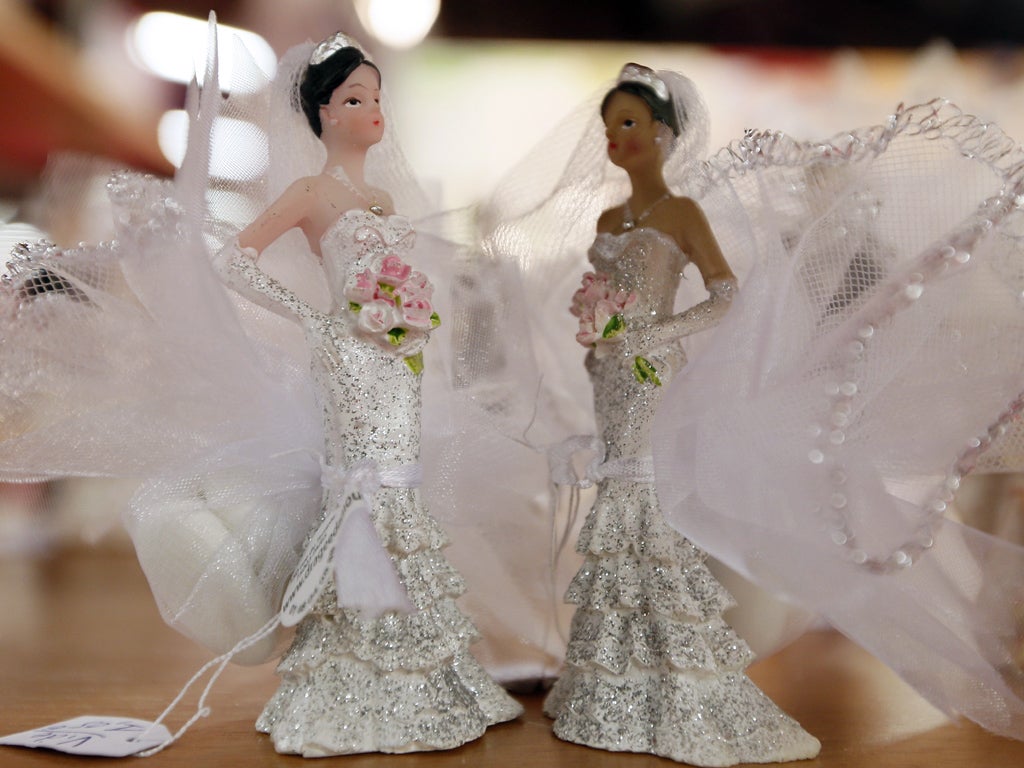The Independent's journalism is supported by our readers. When you purchase through links on our site, we may earn commission.
All that's missing is the word 'marriage'
Eight years ago, The Civil Partnership Act was introduced. It's time to move forward once again so things are completely equal.

Cameron was expected to speak out yesterday at the Conservative Party conference in support of his acknowledged commitment to same-sex marriage.
In the face of protesters and party rebels, he didn’t. But George Osborne, William Hague, Boris Johnson and Maria Miller all did. The Tory party’s, albeit rather diffident, support of same-sex marriage may herald the real end of centuries of hypocrisy and prejudice in our country.
The last decade, the Blair years, saw a wave of legal updating. However, The Civil Partnership Act 2004 was the coup de force and may transpire to be Blair’s most momentous reform. It was same-sex marriage in almost all but name, with all the legal rights of marriage awarded.
The differences between Civil Partnership and marriage were merely technical and to do with some old legal definitions of sex: since the definition of adultery involved penetrative vaginal sex, civil partners could not divorce for adultery, although they could use the other, behavioural, ground to achieve the same thing, rather as Hilary Clinton would have been obliged to do if she had taken exception to her husband’s fellatio with Monica Levinsky. They could also not annul for non-consummation, as consummation, again, was defined as penetrative vaginal sex. However, as the famous, Priscilla, Queen of the Desert case of Lawrence v Gallagher confirmed last year, the treatment in financial claims on divorce was exactly the same for civil partners as it was for married couples.
Parliament stopped short of calling Civil Partnership marriage, however. It was a bridge too far for our society at that time. We therefore have arrived at a messy half-way house whereby some civil partners feel like a second-class order, not permitted formally to call themselves married (although most do informally), and some heterosexual couples are deciding they like the look of an institution that has all the legal rights of marriage but doesn’t go by that, culturally loaded, name.
The general consternation about current proposals for legitimising same-sex marriage seems to revolve around the idea of the church being forced to recognise it. But that is not what’s on the agenda here. What is proposed is that same-sex marriage be permitted in state ceremonies, the registry office/non-religious venue weddings that have long been the alternative to religious weddings. There have always been two sorts of marriage - church and state. Religions would be free to have their own rules - this would be state, not church, same-sex marriage. The present furore is, therefore, largely either hype or based on error and incomprehension.
The question remains, of course, how far can church discrimination be allowed to subsist?
From my own point of view, I’m a strong advocate of religious freedom and an opponent of religious bigotry - a difficult balance to sustain. As a practising Roman Catholic who grew up with a stoutly Presbyterian grandmother and learned about Islam from a devout, if liberal, Pashtun Muslim father, who married with a full nuptial mass then divorced and became a divorce lawyer and is now living with the son of one of the first Anglican women priests, I have both a profound respect for religions in all their diversity and a strong sense that they have to accommodate the individuality of humanity.
Inevitably, any grouping, any club or society, will have its own rules, and in some cases these rules are allowed to encroach even into the “forbidden” discriminatory areas of gender, race and religion. There are “gentlemens’’” clubs which refuse to admit women, and a women’s college in Cambridge, although how well those would stand up to legal challenge remains to be seen.
Most churches refuse to marry couples where neither party is a member, and most faith schools prioritise members of their own faith. Given that churches and schools already discriminate on the grounds of religion, and some, the Catholic church notably, on the grounds of gender, we are generally comfortable with the idea of a church which refuses to marry a gay couple, broadly on the basis “their gaff, their rules”. After all, anti-gay discrimination in employment came in only a whisker ago. But what if a church refused to marry a black couple? Immediately that crosses an imperceptible line from religious freedom into bigotry and the civically unacceptable.
The reality is, that imperceptible line moves, infinitesimally, sometimes retreating but usually advancing. That movement is what made Civil Partnership, rather than marriage, the most society could handle almost a decade ago, and now makes same-sex marriage seem obviously right for a solid chunk of the middle ground of society.
Whatever next? We are a society on the move, embracing reform, with a Prime Minister who says the Conservative party is at its strongest when it is reforming and the present task is to reform our broken society. As humanity attempts to focus more on the reality of relationships, on the critical kernel of love and human connection, then whatever way people find willingly to bind themselves together, to commit to each other, be that by way of marriage, partnership or friendship, gives a society of freer and more supported people, more able to love and, thereby, by the fundamental standards of most religions, closer to God.
Independent Voices has launched a campaign to legalise same-sex marriage. To read more about our Equal Partners campaign and sign the petition, click here.
Sign the petition today!
Join our commenting forum
Join thought-provoking conversations, follow other Independent readers and see their replies
Comments
Bookmark popover
Removed from bookmarks